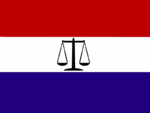Old Francillian
| Old Francillian | |
|---|---|
 | |
| Spoken in | Francisville |
| Total speakers | 0 |
| Family | Indo-European
|
| Type | Artlang |
Old Francillian is the name given to the constructed language dialects originating in the Democratic Duchy of Francisville, and the original form of the Francillian language. The use of the Old Francillian fell into decline, and it is now considered obsolete. Old Francillian is the predecessor to Modern Francillian and Francillish, a dialect originating in Landashir.
Modern speakers of these languages are unable to understand Old Francillian. Modern Francillian evolved with the influence of [[w:Luxembourgish_language Luxembourgish], [1]] and other languages, and many of its roots have radically evolved or have been lost. Resources about the language are limited, but efforts are now being made to preserve them as far as possible.
History
The Francillian language was developed in 2009. The language was originally based on the High German Languages, which principally include [[w:German_language Standard German] and [2]]. However, the early Francillian language differed heavily from these languages. Old Francillian contained many loan words, mainly from German, French, Dutch and Luxembourgish.
Decline and Evolution
The table below shows the modern day distinction between English, German, Francillian, and Francillish.
| Language | Text |
|---|---|
| English | In their natural habitat, budgies live in some very large flocks. These are noticeable through their flight noise as well as by their trilling communication calls. |
| German | In ihrem natürlichen Verbreitungsgebiet leben Wellensittiche in teils sehr großen Schwärmen. Diese fallen durch ihr Fluggeräusch sowie durch ihre trillernden Kontaktrufe auf. |
| Old Francillian | Perrugen leeben, ans hin naturlesch virbreitunsregion, in metsem groussen Shwärm. Deës ressort durch hin Flieggenbréi soudur hin trillerden contaktappelen. |
| Francillian | In hirem natuerlech Firbreitoungsgebidd liefen Perruegen in engzen jo groussen Schwërmen. Diesen fallen duerch häin Flueggsbréi souhier duerch hiren drielloungen Kontaktroungen op. |
| Francillish | In hinse naturlëche Virbréitunsregion leebt Perruechen in zom ja grousse Schwërmen. Déne fallt duerch hinse Flueggenbréi mëtso hinse trelluenge Kontaktruegen. |
Vocabulary
Alphabet and Pronounciation
Old Francillian uses the 26 Latin Letters, in addition to the modified letters: é (ay), è (eh), Ç (s) and ß (ss). Francillian did contain French influenced letter combinations such as -ois, which have generally died out in succeeding languages. Apart from this, nearly all letters in a word were pronounced.
Common Words and Phrases
- Hello (formal) or Good Afternoon: Moien
- Hi (informal): Salut
- Greetings: Brakhot
- Good Morning: Gutt Morgan
- Good Evening: Gutt farge
- Good Night: Gutt Niht
- Goodbye: Senere
- Yes: Ja
- No: Nat
- Please: Hattes
- Thank you: Merci
- How are you: Kat gees dech?
- Well: Weltz
- Bad Bedel
- Alright/ not bad: fin
- How: Kat?
- What/ Which: Firn?
- Where: vort?
- With: avec
- And: Und
- But: Mais
- November: Eedengméiet
Grammar
Nouns and Gender
Old Francillian was split according to:
- Three Genders: masculine, feminine, and neuter
- Three Cases: nominative, accusative, and genitive (the dative becoming joined with the accusative)
- Two numbers: Singular and Plural
| Masc. | Fem. | Neuter | Plural | |
|---|---|---|---|---|
| Definite (the) | de | das | d' | den |
| Indefinite (a/an) | he | has | h' | hen |
| Partitive (some) | Met | Met | Met | Metsem |
Pronouns
Personal Pronouns in Francillian were as below. With the genitive case, the weak version (my, your) is shown. In the strong version (mine, yours) any additional letters shown in the brackets are added. Possessive pronouns in Old Francillian did not change with gender.
| Nominative (I) | Accusative (me) | Genitive (my/mine) | |
|---|---|---|---|
| I | Mech | Met | Min(e) |
| You | Dech | Det | Din(e) |
| He | Hen | Het | Hin(ne) |
| She | Sen | Set | Sin(ne) |
| It/ You (generic) | Il | Il | Ils(e) |
| We | Nous | Nous | Notre(s) |
| They | Mir | Mir | Mirsem |
Verbs
Most Old Francillian verbs were regular, . Regular verbs in Old Francillian were not conjugated in the present tense. The language used the past perfect and the past perfect/ An older form know as the imperfect also existed, but was rarely used. The future tense in Old Francillian was formed by conjugating the verb itself, rather than with the use of an auxiliary verb, which appears unusual to modern Francillian speakers. The conjunctive was generally not used in Old Francillian expect in a number of irregular verbs.
The two most commonly used irregular verbs are Vant (to be) and hatsin (to have).
Vant (to be) - Mech van (I am), Dech Va (You are), Hen vas (He is), Sen vas (She is), Il vas (It is), Nous vaten (We are), Mir vat (They are)
Hatsin (to have) - Mech hat (I have), Dech hats (You have), Hen has (He has), Sen has (She has), Il has (It has), Nous hatsin (We have), Mir hatan (They have)